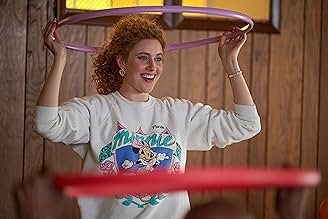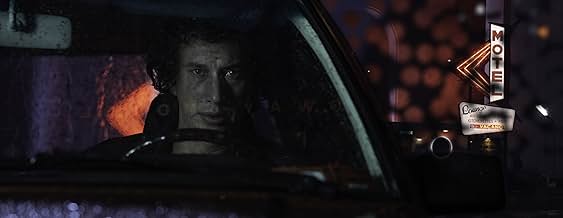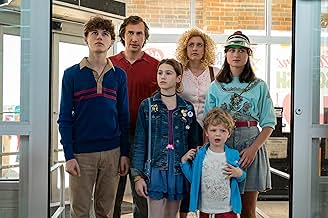IMDb-BEWERTUNG
5,7/10
46.686
IHRE BEWERTUNG
Dramatisiert die Versuche einer amerikanischen Familie, mit den Konflikten des Alltags umzugehen und sich mit den Geheimnissen von Liebe und Tod auseinanderzusetzen.Dramatisiert die Versuche einer amerikanischen Familie, mit den Konflikten des Alltags umzugehen und sich mit den Geheimnissen von Liebe und Tod auseinanderzusetzen.Dramatisiert die Versuche einer amerikanischen Familie, mit den Konflikten des Alltags umzugehen und sich mit den Geheimnissen von Liebe und Tod auseinanderzusetzen.
- Auszeichnungen
- 2 Gewinne & 25 Nominierungen insgesamt
Wickham Reeve
- College on the Hill
- (as Wickham Bermingham)
Mathew Williams
- College on the Hill
- (as Matthew Williams)
Empfohlene Bewertungen
I don't know how to describe this film, but it almost feels like watching 3 different films. It started like a parody of dead poet society, then follows up by a parody of war of the world, then a parody of unfaithful. And it seems like there's no correlation between these sequences.
Yes, i'm aware White Noise is a satire of a supposedly average american family dealing with mundane troubles of death, live, love blah blah blah. Yes, i know it's based on a novel. No, i haven't read the novel. But seeing this film as is, and for whatever this film trying to be, i don't find it entertaining. Most of the humorous aspects are cringe.
4/10.
It's a 'surrealism film' , but not really.
Yes, i'm aware White Noise is a satire of a supposedly average american family dealing with mundane troubles of death, live, love blah blah blah. Yes, i know it's based on a novel. No, i haven't read the novel. But seeing this film as is, and for whatever this film trying to be, i don't find it entertaining. Most of the humorous aspects are cringe.
4/10.
It's a 'surrealism film' , but not really.
This film has some hilarious one liners and twisted distortions of reality. The first act had me so intrigued I was gripped. Then I was confused. Then I couldn't decide if it was a comedy intentionally or not.
The reality is this film doesn't quite know what it is, and if you think it's going to go somewhere or wrap anything up at the end then you are dead wrong.
Weird for weirds sake is the name of the game. Think of a psychedelic trip by someone who likes the smell of their own farts and decided to write it down.
A future cult classic in the making and I'm sure many people will revere this film for years to come; rewatching it for it's one liners and oddities. For me however one baffling, confusing watch is enough to last a lifetime.
The reality is this film doesn't quite know what it is, and if you think it's going to go somewhere or wrap anything up at the end then you are dead wrong.
Weird for weirds sake is the name of the game. Think of a psychedelic trip by someone who likes the smell of their own farts and decided to write it down.
A future cult classic in the making and I'm sure many people will revere this film for years to come; rewatching it for it's one liners and oddities. For me however one baffling, confusing watch is enough to last a lifetime.
White Noise is, undoubtedly, the strangest movie Netflix has released this year, which is saying a lot given the competition. The plot is all over the place, the dialogue very stylized, and the overall atmosphere is engaging but off-putting. It's the type of movie that is sure to cause a lot of division in audiences.
At its core, White Noise is about a college professor named Jack and his middle class family dealing with their fear of death, but what actually happens is quite complicated. So complicated, in fact, that it feels like three separate movies smashed together. To be fair, the novel is just as ungainly and incoherent, but at least you had the sense that you were the one with the problem. There was a mystique to DeLillo's writing that made it seem like there was a lot going on thematically with the strange choices. But in the movie? It just seems like bad, pretentious writing. I'm not even sure if Baumbach knew what DeLillo's aim was, or if he just guessed.
One symptom of this is that the unnatural dialogue stick out like a sore thumb: in a scene where Jack's wife, Babette, says how open she is with communicating her feelings, Driver says "That is the point of Babette." In another moment, Jack is shopping with his coworker when said coworker suddenly says that Jack's wife's "hair looks important." What is the point of lines like this? Because all it accomplishes is taking you out of the moment and reminding you that you're watching a movie with a script. Not to mention the multiple long, unintelligible "philosophical" monologues that occasionally pop up. Is it an intentional commentary on the hollowness of academia? If so, then why are they presented so uncritically and played dead straight? It's just another disjointed element of the movie that seems unfinished.
But even if the script fails them, the cast and tech crew don't give up on trying. Driver and Gerwig give very different performances, the former acting almost like an intentional caricature of a sitcom dad, and the latter trying to be serious the whole time. And yet it's one of the few disparate combinations in the film that actually pays off: their acting is convincing as a real couple. Gerwig, in particular, brings emotion to scenes that were completely absent of it on the page. The production design and score are also on point, creating a distinct and interesting atmosphere that also furthers the film's supposed social commentary. But none of this is quite enough to save White Noise from itself and its shortcomings.
The best part of the film is far and away the end credits. I'm not saying that as some sort of flippant joke about the movie's quality, it's a genuinely incredible sequence. Somehow it captures the exact type of weirdness and existentialism and fun that's absent from the rest of the movie. It's so good that, in all honesty, you could probably skip the rest of the movie for it. White Noise is consistently watchable and unique, unlike anything else you'll see this year. But it's aimless, confused, and ultimately baffling to make any significant impact.
Final Score: 62/100.
At its core, White Noise is about a college professor named Jack and his middle class family dealing with their fear of death, but what actually happens is quite complicated. So complicated, in fact, that it feels like three separate movies smashed together. To be fair, the novel is just as ungainly and incoherent, but at least you had the sense that you were the one with the problem. There was a mystique to DeLillo's writing that made it seem like there was a lot going on thematically with the strange choices. But in the movie? It just seems like bad, pretentious writing. I'm not even sure if Baumbach knew what DeLillo's aim was, or if he just guessed.
One symptom of this is that the unnatural dialogue stick out like a sore thumb: in a scene where Jack's wife, Babette, says how open she is with communicating her feelings, Driver says "That is the point of Babette." In another moment, Jack is shopping with his coworker when said coworker suddenly says that Jack's wife's "hair looks important." What is the point of lines like this? Because all it accomplishes is taking you out of the moment and reminding you that you're watching a movie with a script. Not to mention the multiple long, unintelligible "philosophical" monologues that occasionally pop up. Is it an intentional commentary on the hollowness of academia? If so, then why are they presented so uncritically and played dead straight? It's just another disjointed element of the movie that seems unfinished.
But even if the script fails them, the cast and tech crew don't give up on trying. Driver and Gerwig give very different performances, the former acting almost like an intentional caricature of a sitcom dad, and the latter trying to be serious the whole time. And yet it's one of the few disparate combinations in the film that actually pays off: their acting is convincing as a real couple. Gerwig, in particular, brings emotion to scenes that were completely absent of it on the page. The production design and score are also on point, creating a distinct and interesting atmosphere that also furthers the film's supposed social commentary. But none of this is quite enough to save White Noise from itself and its shortcomings.
The best part of the film is far and away the end credits. I'm not saying that as some sort of flippant joke about the movie's quality, it's a genuinely incredible sequence. Somehow it captures the exact type of weirdness and existentialism and fun that's absent from the rest of the movie. It's so good that, in all honesty, you could probably skip the rest of the movie for it. White Noise is consistently watchable and unique, unlike anything else you'll see this year. But it's aimless, confused, and ultimately baffling to make any significant impact.
Final Score: 62/100.
As someone who didn't read the book the movie is based on, i will say that i did not connect with this movie or the characters. Am ok with not connecting with characters but the characters in this movie are hard to understand which is odd because they talk and talk (usually at 100 miles an hour and over each other) so you think they would be all out in the open but it was like a wall between them and me. Like i completely failed to understand what it was that the author was saying about the world or the country when he wrote the book. Though i assume that the book was making some sort of commentary about the state of affairs because this movie feels somewhat too large in scale to just be a movie about coming to term with mortality and the difficulties that can arise in a marriage. Like the movie isn't bad but what are you? I will watch it again when it comes out on Netflix to try and see it with fresher eyes but if the purpose of the movie is to frustrate people so much that we rewatch it multiple times, i will say that they will succeed.
For the first hour of White Noise, I found myself very entertained. But for the second half I found myself incredibly bored. They felt like two separate films. If the first half had just been the whole film. I probably would have have given this film an 8. Or possibly a 9. It goes from being an apocalyptic family satire, to a revenge tale. I believe Noah Baumbach didn't even know what exactly he was going for. White Noise was average. The two aspects holding me back from giving it a 4 are again the first half and another stellar performance from Adam Driver. Nowhere near as good as Marriage Story. Then again they are very different films.
Wusstest du schon
- WissenswertesThis is Noah Baumbach's first time writing and directing a book-to-screen adaptation, and only his second adaptation after co-writing the screenplay for Der fantastische Mr. Fox (2009).
- PatzerIn the opening scene, many vehicles featured in Murray's crash sequence reel are from the 1990s and 2000s, whereas White Noise takes place in the 1980s.
- Crazy CreditsThere is a scene at the end where the characters dance in a supermarket. As the credits start to roll, this sequence is played partially in reverse as the music continues to play normally.
- SoundtracksLincoln Portrait
Written by Aaron Copland
Top-Auswahl
Melde dich zum Bewerten an und greife auf die Watchlist für personalisierte Empfehlungen zu.
- How long is White Noise?Powered by Alexa
Details
- Erscheinungsdatum
- Herkunftsländer
- Offizieller Standort
- Sprachen
- Auch bekannt als
- Ruido De Fondo
- Drehorte
- Wellington, Ohio, USA(Storefronts are built out and set up for July filming)
- Produktionsfirmen
- Weitere beteiligte Unternehmen bei IMDbPro anzeigen
Box Office
- Budget
- 145.000.000 $ (geschätzt)
- Weltweiter Bruttoertrag
- 71.728 $
- Laufzeit
- 2 Std. 16 Min.(136 min)
- Farbe
- Seitenverhältnis
- 2.39 : 1
Zu dieser Seite beitragen
Bearbeitung vorschlagen oder fehlenden Inhalt hinzufügen



























